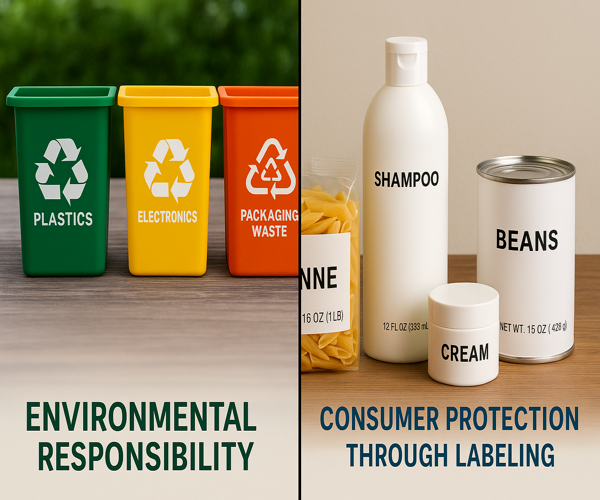Today, businesses must follow many rules to help protect the environment and ensure fair trade. Two important registrations that companies often need are EPR Registration and LMPC Registration. If you are a business owner, an importer, or just curious about how things work, understanding these registrations can be very helpful. Let’s break them down in easy English!
What is EPR Registration?
EPR Registration stands for Extended Producer Responsibility Registration. It is a system created to make producers responsible for the entire life cycle of the products they sell, especially for managing the waste that comes from those products.
In simple words, if a company makes, imports, or sells products like electronics, plastics, batteries, or packaging materials, it must make sure that the waste from these products is properly collected and recycled. The government has made EPR Registration mandatory for these companies to encourage recycling and reduce pollution.
Why is EPR Registration Important?
-
Environmental Protection: It helps reduce the harmful waste that ends up in landfills, rivers, and oceans.
-
Legal Compliance: Without EPR Registration, companies can face heavy fines or even be banned from selling their products.
-
Brand Image: Companies that show they care about the environment build a positive image among customers.
-
Resource Efficiency: Recycling materials reduces the need for raw materials and saves energy.
In India, different products have different EPR rules. For example, companies dealing with e-waste must follow the E-Waste (Management) Rules, 2022, while those handling plastic waste must comply with the Plastic Waste Management Rules, 2016.
What is the Process for Getting EPR Registration?
The process of obtaining EPR Registration usually involves these steps:
-
Application: Fill out an online form on the Central Pollution Control Board (CPCB) portal or the State Pollution Control Board (SPCB) portal.
-
Submit Documents: Provide details like business registration, product information, recycling plan, and agreements with waste handlers.
-
Review by Authority: The government will check if your application and documents are correct.
-
Issuance of Certificate: If everything is in order, you will receive your EPR Registration certificate.
It is always good to seek help from experts who understand the rules well to avoid mistakes and delays.
What is LMPC Registration?
While EPR Registration focuses on environmental responsibility, LMPC Registration is about fair trade practices. LMPC stands for Legal Metrology Packaged Commodities Registration.
Any business that imports pre-packaged goods into India must obtain LMPC Registration under the Legal Metrology Act, 2009. A pre-packaged commodity is any product that is packed without the buyer being present, whether it is food, cosmetics, electronics, or other consumer goods.
Why is LMPC Registration Important?
-
Consumer Rights: It ensures that consumers get the correct quantity and quality for the money they pay.
-
Avoid Legal Trouble: Importing or selling products without LMPC Registration can result in fines and confiscation of goods.
-
Market Trust: Proper labeling builds trust among customers and gives your brand more credibility.
The government checks if products have clear labels with important information like:
-
Manufacturer’s name and address
-
Date of manufacture and expiry
-
Quantity and weight
-
Maximum retail price (MRP)
-
Customer care details
How to Get LMPC Registration?
The process for LMPC Registration includes:
-
Application: Submit an application to the Controller of Legal Metrology in your state.
-
Documentation: Provide a business license, product samples, importer-exporter code (IEC), and packing details.
-
Inspection: Sometimes, officers may visit your business location to check everything.
-
Approval: After verification, you will receive the LMPC Registration certificate.
Just like with EPR Registration, hiring a professional consultant can make this process easier and faster.
Conclusion
Both EPR Registration and LMPC Registration are crucial for businesses in India today. They help in creating a cleaner environment and promote fair business practices. If you plan to manufacture, import, or sell goods, it is very important to stay updated with these regulations.
Getting these registrations not only keeps you on the right side of the law but also builds a responsible and trustworthy image for your business. It might seem complicated at first, but with the right guidance, EPR Registration and LMPC Registration can be completed without much trouble.
So, if you haven’t already, start planning your compliance journey today. A greener earth and happier customers await you!


